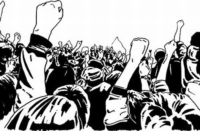Readers of Socialist Voice may be familiar with the idea of worker self-directed enterprises, or WSDEs. The idea is promoted in the United States, particularly by the Marxian economist Richard Wolff.
Those who are not acquainted with the logic behind WSDE might be well served by engaging with this topic, as it potentially offers a strategy for advancing workers’ class interests. Furthermore, WSDE theory raises important issues about our understanding of planning, markets, ownership and the state in useful, if somewhat simple and schematic, terms.
WSDE also suggests a potential transition away from capitalism towards socialism that, although not orthodox within our traditional canon, is worth considering.
Some of what follows is well known to readers of Socialist Voice, but some additional points are worth considering.
In capitalism, as readers will know, private owners establish enterprises and select their directors, who decide what, how and where to produce, and what to do with the income received from selling the output. Put in simple terms, this small class of people, the shareholders (to different degrees of magnitude) and the boards of directors they select make economic decisions for their benefit.
The collection and concentration of profit in the hands of this relatively small class in turn enables significant, disproportionate but not total political power in the wider society. The majority who do the productive work remain outside the decision-making about what to produce, how to produce it, and what to do with the proceeds of their labour.
We already know the dysfunctional consequences of this economic structure, so we have little need to regurgitate this here (nor do we need to deal with the clichéd objection that significant sections of workers are already “capitalists,” given that their pensions are aggregated in funds that purchase corporate shares).
In contrast, WSDE presents a scenario whereby workers take command of their existing or new individual enterprises to which they contribute their labour. Workers at the company level would democratically produce, distribute and control their product and its realised profits at the point of origin in the enterprise.
Several consequences are implied by this simple conception. Each WSDE seems to be an autonomous actor, and there seems to be a free market in the entry of WSDEs. There is democratic planning within the firm, in what to produce, how to produce it, and what to do with the proceeds (it is not dictated to by, say, the state planners). The revolution here is that the planning is democratic at the micro level. Planning already occurs within capitalist enterprises (often at the global level), but it is not democratic.
Accounts of WSDE are somewhat underdeveloped on the following matter, but the output of WSDE continues to be produced and distributed on the basis of market supply and demand. WSDE theory operates on the assumption that capitalism is defined by the ownership, organisation and control of production. Markets (like planning) are purely exchange mechanisms and can occur under different types of ownership.
In the case of certain commodities, markets can be a more efficient distributive mechanism than macro forms of central planning. Central planners may be very good at determining a country’s electricity needs or transport-infrastructural requirements and can plan accordingly. They may be useless, however, at determining social preferences for particular types of consumer goods, for example (of course whether many consumer goods are socially useful is a complex point that cannot be answered here).
WSDEs operate like a type of market micro-socialism (micro in the sense that socialised ownership is emphasised at the company level). Market socialism was experimented with—to varying degrees of internal work-place democracy—in Hungary and Yugoslavia. The evidence suggests mixed success, various trade-offs, and limitations. Inevitably, given the reliance on market co-ordination, there may arise some income inequality, inflation, falling real wages, and unemployment.
Of course such problems may be moderated by tripartite regulatory influence involving WSDE producers, consumers (citizens), and the central or regional state actors—for example price or income controls and working-time management—to ensure full employment.
There is also the potential for anti-social behaviour on the part of some WSDEs: charging monopoly prices, internal degradation of their democratic structure, or malign political influence. This might be a problem where WSDEs get too big, although constraining organisational size might mean forgoing economies of scale.
Ultimately, WSDE theory argues that socialists need to recognise that the standard emphasis on macro level institutional change from private to social ownership of productive assets (“public ownership of the means of production”) and from markets to planning “for the benefit of the whole people” is insufficient conceptually and strategically. It pays far too little attention to transformations at the micro level and especially inside enterprises. The socialisation of enterprises, above all, means changing their internal organisation.
The reorganisation of production in WSDE theory is claimed to provide the conditions whereby the state becomes subordinate to WSDEs (there is not much in WSDE theory about capturing or transmogrifying the state, a standard concern of Marxism-Leninism, for example). It simply holds that state revenue would come to depend on what workers give the state out of the income of WSDE. Instead of capitalists financing or controlling the state (or both), democratic WSDE would gain that crucial position. Of course this hypothesis is silent about the influence of international non-WSDE actors that might hold government debt (a complication we can leave to one side for now).
WSDE theory, while revolutionary at the micro level, seems transitional at the macro level. This, however, is probably consistent with history. Capitalism emerged from feudalism over several centuries. Early capitalism was marked by failed experiments, with feudal lords often seeking to destroy such initiatives, or because capitalists lacked raw materials, sufficient “free” labour, or adequate markets.
The transition from capitalism to socialism may well display comparable fits and starts: only a caricature of a socialist believes we can “overthrow” capitalism by a one-off revolutionary decree. WSDE theory implies that WSDEs will co-exist with capitalist firms and a state that is subject to continuous class struggle until one side commands enough resources to dominate the other. Indeed there may never be an end-state “pure socialism”: rather a dynamic scenario may exist comprising mixtures of WSDE, capitalist firms, and so on.
Some questions to consider. Does WSDE theory imply that communists should turn their attention to advancing the accumulation of autonomous WSDE experiments at the micro level? Can autonomous zones of WSDE operate within a wider sea of capitalism?
For example, unless banks were subject to either state-monopoly socialisation or micro-level WSDE transitions, would the WSDE sector be squeezed out by self-preserving capitalist financiers who would, for class (political/social/economic) reasons, seek to avoid, or sabotage, such experiments?
Similar issues arise with WSDE supply chains. Should communists give priority to a political struggle directed at state influence and a simultaneous campaign to promote WSDE? If emphasis is unduly on the former, will not attempts to acquire state influence be undermined by the normal routine of capitalist-owned firms with the incentives and resources (material, ideological etc.) seeking to prevent such influence from taking root?
Alternatively, if the priority is WSDE, does this risk inevitable encirclement by hostile state and capitalist forces, or does this create autonomous zones of socialism that act as a positive pattern-setter for other workers, industries, and sectors? Or do communists first concentrate on political power to provide the necessary conditions in which WSDE might flourish?
If WSDEs operate in markets, how are the negative effects of such exchange mechanisms addressed? Might we infer from WSDE theory that communist energies spent on building trade union power at the work-place level, for example (i.e. institutions that accommodate and moderate capitalist power but do not challenge it), might be better spent on promoting and building successful WSDEs (institutions that eliminate capitalist power at the individual micro level)? Or perhaps trade unions (along with parties of our type) are one vehicle for the promotion of WSDE?
For comrades not familiar with the topic in full it might be worth considering the references below, which are relatively affordable and probably available from Connolly Books and other left-wing booksellers.
R. D. Wolff, Democracy at Work, Chicago: Haymarket Books, 2012.
R. D. Wolff, “Part IV” in Capitalism’s Crisis Deepens, Chicago: Haymarket Books, 2016.






